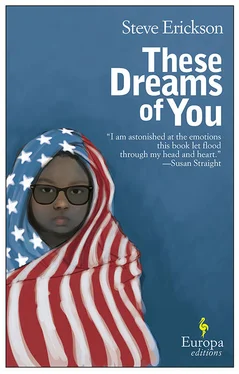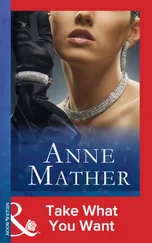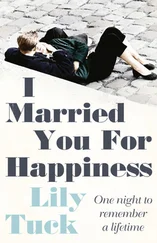Within the first nine or ten thousand words of Zan’s novel, this and that happens, most of which Zan knows he’ll wind up cutting. The story really begins when the young German skinhead follows the protagonist one night and, near the entrance of the U-Bahn, with a gang of other skinheads who call themselves the Pale Flame, viciously beats the writer and leaves him for dead in the street.
Or maybe actually he is dead. This novel being not remotely autobiographical, it’s hard for Zan to be certain. In any case, before the writer passes out, he has a kind of reverie of his memory floating away, like a balloon that Viv got for Sheba while shopping, which the girl let go just for the sensation of watching it vanish in the sky.
As the dying man lies in the street, a black teenage girl emerges from the shadows where she’s hidden while the incident took place. She recognizes the members of the Pale Flame as men who would do to her something worse than what’s being done to the man, which is to say worse than murder. It may be hard for Zan’s reader to imagine something worse than murder, but Zan believes there’s such a thing, and the girl believes it too.
Zan knows that a novel keeps secrets from its author, and the first secret this novel keeps from him is that, like his own daughter, the teenage girl in the story is a transmitter, broadcasting from parts unknown. Like Sheba, her body perspires in song. Once the skinheads have left, the girl approaches the man in the street; clearly he’s dead but she feels obligated to make sure. By his side she kneels, clutching to her all of her papers and books, when she hears herself rise in volume — and then when he stirs, she’s so startled that she flees, dropping by his side an old battered paperback she’s had since she was a child, before she could read.
Why is she black? Zan wonders, annoyed with himself for asking. Can I make her a black girl? When he sees her in his head, she’s black, so that should be the end of it, but do I have the right to make her black? She’s not a major character at all, rather someone who sets in motion a plot, so is it exploitative to make her black when there’s no point to it?
Or is it wrong to think there has to be a point to it? Characters are black only because they need to be? But what do I know about being black? Isn’t any white person who writes about race asking for trouble? Of course I don’t know anything about being a teenage girl, either. For that matter I don’t know anything about being anyone else, other than who I am.
Also secret from Zan is a drawing on the opening blank page of the old battered paperback that the girl has dropped. Nor does the unnamed man left for dead in the street know of the drawing, because by the time he wakes, it isn’t there, having been ripped mysteriously from the book in the hours between.
It’s a drawing of a woman who happens to be the teenage girl’s mother. The sketch is crude and quick but not untalented, done with colored pencils, the woman in shades of brown except for her distinctive, misplaced gray eyes. None of this can mean anything to the man lying in the street; but though Zan knows nothing of the drawing either, it means a great deal to him, because he met the subject of the sketch once, in an encounter so brief and frenzied that it lasted only seconds but saved his life.
Zan grew up in the white L.A. suburbs. His parents were midwesterners who came, as his father acknowledged one night during the evening news while black people were being hosed down and attacked by dogs on television, from a past where white and black didn’t meet. Whatever their attitudes about race, Zan’s parents tried to protect him from those attitudes; the n-word wasn’t used in the house. Nonetheless not a single thing about the black experience penetrated Zan’s own until he was the age that his own son is now.
That was when he came home one afternoon from school and on his parents’ stereo played a record of country songs sung by a blind black man. This wasn’t the sort of music that Zan had heard before, and though for decades afterward purists would declaim the aesthetic offense of a soul genius committing his voice to such white songs and white strings and white arrangements, to the twelve-year-old Zan the music’s surrounding whiteness made the blackness of the voice all the more shocking.
Decades later Zan understands that, as epiphanies about race go, this is pretty pathetic. Still, it rearranged the furniture in Zan’s head, knocked out one or two of the walls. Zan would know for the rest of his life that this was the most subversive record ever made, the white trojan horse that smuggled a blind black man into the gates of Zan’s white city. Every afternoon, returning home from school, Zan snuck the record down to his own room and listened to it over and over, the volume low because it felt like something he should get in trouble for, like reading a forbidden book.
The only child of a socially and politically conservative family, lower middle class when he was smaller, on the edges of upper middle class by the time he finished high school, Zan was a fifteen-year-old rightwinger before the erosion of his adolescent certainties by the television images of Negroes at the mercy of flying police sticks. That erosion was the end of one nascent political identity, such as it ever was, and the beginning of another, such as it ever would be, and by the time Zan was a college student, he found his political psyche outflanked on all sides. Students graced their dormitory walls with posters of the leader of a revolution in China, one of the great killers of the Twentieth Century; and for all the ways that Zan’s parents came to suspect their son was kidnapped in the night by leftwing professors who implanted a Marxist chip in his brain, in fact Zan felt less a part of anything and more an odd man out of everything. One afternoon between classes, in the tumultuous aftermath of four students murdered by the National Guard at another school in another part of the country, Zan stopped in the middle of the campus quadrangle to note a line of armored police to one side and protesting students to the other, with him squarely in the middle alone, which so summed up his ambivalence that it would seem to have been staged. Whatever else was true, however, and for all ambivalence’s varieties that cluttered philosophical clarity, one thing was incontestable to Zan and it was that his political conservatism failed the nation’s great moral test of the decade, which was how to redeem the transgression of slavery that betrayed his country’s original promise.
Within Zan’s first week as a college student, he published a piece in the university newspaper about the prospective presidential candidacy of a senator who, like Zan, once was a rightwinger and now was. . what? besides the brother of a martyred president, and embraced by blacks as no white politician had been since the president who ended slavery a century before.
In his student writing group that met off campus, Zan remained odd man out from the beginning. When the joint was passed he was the only one who declined, which raised eyebrows a week later when the class arrived to find it narrowly had missed a police bust. Zan immediately was suspected as the rat, “then we read your writing,” one of Zan’s fellow students explained later, “and realized you’re the trippiest one of all.” Zan’s teacher was a New Englander named Logan Hale, a novelist in his mid-fifties of some renown; as a young man Hale had been Leon Trotsky’s bodyguard in Mexico in the Thirties, resigning when he became convinced that Trotsky’s inevitable murder in fact was, for all intents and purposes, suicide — contrition by Trotsky for the Stalinism that he not only hadn’t stopped but, in his own mind, set in motion.
Читать дальше











